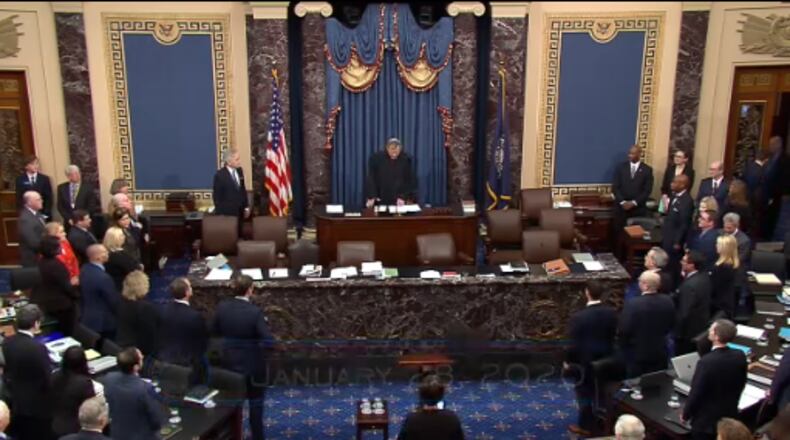"There is no need for more evidence to conclude that the President withheld United States aid, at least in part, to pressure Ukraine to investigate the Bidens; the House managers have proved this with what they call a 'mountain of overwhelming evidence,'" Alexander said in a statement, concluding the charges did not rise to the level of impeachment.
“Let the people decide,” Alexander said, noting that the 2020 election gets underway in earnest on Monday with the Iowa Caucuses.
There is no need for more evidence to conclude that the president withheld United States aid, at least in part, to pressure Ukraine to investigate the Bidens; the House managers have proved this with what they call a “mountain of overwhelming evidence.” 3/15
— Sen. Lamar Alexander (@SenAlexander) January 31, 2020
Lisa Murkowski is in there... somewhere. pic.twitter.com/zo6mETzCn4
— Andrew Desiderio (@AndrewDesiderio) January 31, 2020
While Alexander announced he would not back more witnesses, Sen. Susan Collins (R-ME) said she would, joining Sen. Mitt Romney (R-UT) as being in favor of extra evidence in the President's trial.
"I will vote in support of the motion to allow witnesses and documents to be subpoenaed," Collins said in a written statement issued shortly before the Alexander announcement.
It was still possible that a vote on witnesses could end in a 50-50 tie, if Sen. Lisa Murkowski (R-AK) joins Romney, Collins, and all 47 Democrats in voting for witnesses, that would produce a deadlocked Senate.
Murkowski said she would announce her decision on Friday.
If the witness vote ends in a 50-50 tie, it would produce a unique parliamentary situation in the Trump impeachment trial.
Normally, the Vice President would have the only power to break a tie vote in the Senate - but in cases of Presidential impeachment, the job of presiding over the Senate falls to the Chief Justice - and there is precedent from 1868 that a Chief Justice can break ties on procedural matters.
If Chief Justice Roberts refused to vote, the witness effort would fail on a tie vote.
With lots of talk about a possible 50-50 tie vote on witnesses, I went back to the Andrew Johnson impeachment trial - and I did find where the Chief Justice broke a tie vote pic.twitter.com/ddtyETnI56
— Jamie Dupree (@jamiedupree) January 30, 2020
On Thursday, there was little suspense about the eight hours of questions by Senators for lawyers on both sides, as House prosecutors and the White House legal team used the time to make their very familiar points.
"If we have a trial with no witnesses, that will be a new precedent," said Rep. Adam Schiff (D-CA), who answered the majority of questions for the House managers.
"There are some in this room that are days away from the Iowa Caucuses taking place," said Jay Sekulow, the President's personal attorney, referring to the Democratic Senators running for President, as the White House legal team argued Mr. Trump was the victim of a political vendetta.
Only a handful of questions caused reporters to sit up and take notice, like one from Sen. Lisa Murkowski (R-AK), which directly asked the President's team about testimony from former National Security Adviser John Bolton.
WATCH: Republican Sen. Lisa Murkowski asks the president's defense team:
— PBS NewsHour (@NewsHour) January 31, 2020
"This dispute about material facts" over the release of aid to Ukraine "weighs in favor of calling additional witnesses with direct knowledge. Why should this body not call" John Bolton?#ImpeachmentPBS pic.twitter.com/FwRqR0Ep89
Addressing concerns voiced by the White House legal team that extra witnesses would bog down the Senate for weeks or months, Schiff proposed on Thursday a one week delay in the trial, to give time for depositions.
"The proposal is we take a week, the Senate goes about its business, we do depositions," Schiff said.
But like other ideas floated on witnesses in the past week, there was no indication that it would draw bipartisan support.
And by midnight on Thursday night, Republicans felt more and more confident that by some time late on Friday night, the Senate would vote to reject the impeachment charges against President Trump.
"Justice will be done. President Trump will be ACQUITTED," tweeted Rep. Mark Meadows (R-NC), a strong Trump ally in the House.
About the Author
